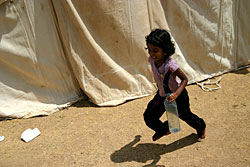 |
Dominique Strauss-Kahn, IMF's managing director said that a staff mission had reached this agreement with the Sri Lankan authorities, and that the program is expected to be considered by the Fund's executive board on 24 July. Its approval "would enable Sri Lanka to draw an amount of about $ 313 million immediately."
In February, Sri Lanka requested an IMF credit facility of $1.9 billion urgently needed to shore up sagging foreign reserves.
Last year, the central bank lost $ 600 million after foreigners pulled out their money in bonds as stock markets began tumbling across the world due to the global economic crisis. Attempts to stave off shortages in the money market have further depleted reserves. By December 2008, gross official reserves stood at $ 1.7 billion compared to $ 3.5 billion in the previous year, which was barely enough to sustain 1.5 months of imports.
Colombo stock markets, boosted by the news, witnessed share prices climb up sharply on Tuesday. This, along with the end of conflict in May, is also expected to trigger a surge in investments.
While most IMF standby credit facilities are approved quickly, considering they are usually meant to offset contingencies, the Sri Lankan application was delayed amid allegations of mounting civilian deaths and other human rights allegations as the government entered the final phase of its war with Tamil Tiger rebels.
On June 21, US Secretary of State Hillary Clinton said that it "is not an appropriate time" to consider the IMF facility, considering the US government was "trying to convince both sides," the Sri Lankan government and the Tamil Tiger guerrillas, to stop fighting.
However, Muttukrishna Sarvananthan, a Sri Lankan economist, believes the issue had nothing to do with politics but economics and meeting fiscal targets.
"My understanding of the real bottleneck is that the Central Bank is yet to put forward a convincing fiscal, monetary, and balance-of-payments stability package to the IMF, taking into account the latest post-war economic imperatives," he said.
Negotiations with Turkey on a similar facility is taking longer than it did with Sri Lanka, he points out.
But another economist, who is close to senior officials at the central bank, said international pressure was dampening Sri Lanka's prospects for the credit facility.
"There was a lot of pressure from western powers to delay the loan until Colombo gets its act together on the political and human rights stage," said the economist, who requested anonymity.
An experienced foreign diplomat, who also spoke off the record, believes that Indian influence on the West saved the day for Sri Lanka.
Last week, on the sidelines of the Non-Aligned summit in Egypt, Indian Prime Minister Manmohan Singh met Sri Lankan President Mahinda Rajapaksa and praised his leadership in winning the war.
"[Singh told] Rajapaksa that he was most suited to enforce a political settlement," the diplomat said. "It looks as though India and Sri Lanka reached some deal to provide Tamils some of their rights.
In return, India [supported Sri Lanka] on the IMF loan issue."
(IPS)


